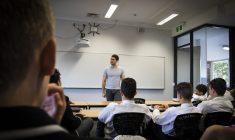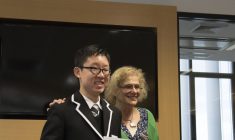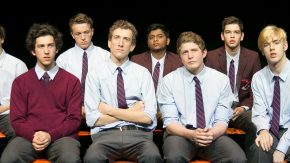From the Editors’ Desk: 8th Biennial Literature Festival
Amidst the hustle and bustle of students moving from one workshop to the next, exploring a poetic device one minute and juggling a literary trick the next, a small group of boys from Year 7 to Year 11 were busy jotting down notes for the official Festival publication ‘PostScript’.
Led by Dr Billy Stevenson in the English Department and Festival presenter Jack Lynch, the Postscript writers, editors and photographers covered events across both Stanmore Senior Campus and Wyvern during the 8th Biennial Literature Festival.
‘Black and White’ spoke to the PostScript boys to find out more their festival highlights and what took away from working ‘behind the scenes’.
Who was your favourite speaker?
“My favourite author I had the opportunity to cover was Tristan Bancks, as he epitomises what I see as the future of literature. As we move forward with technology, authors will need to adapt their methods of content delivery and Tristan has more than achieved this. Using an amalgamation of online media including small games and videos to accompany his books, Tristan is able to greatly expand the audience that his ideas can reach, and from both covering his sessions and talking to him in conversation, it was exceptionally interesting to learn how he works with both his young sons and his publisher to produce these unconventional additions to his books” – Tom Barker (11/FL)
“My favourite author was Arnold Zable. His words evoked emotion from the crowd as he told many inspirational stories about overcoming challenges in his life. He demonstrated such a positive mindset, which is something I aspire to having” – Anton Lising (7/JN)
What did you like most about being an editor on the PostScript team?
“I liked the time pressure imparted by our deadlines. If anything, I think writing for PostScript improved my ability to write under pressure. I often found myself producing articles 20 minutes before a deadline. I created a false sense of desperation for myself, which spurred me on to meet the 2:30pm cutoff.” – Luke Canter (7/JN)
“I liked having the privilege of meeting many of the authors and being mentored by some of them. I also loved collaborating with a team” – Anton Lising (7/JN)
“Being a member of the Postscript was a great honour and it really helped develop my writing skills, as well as my communication ones. It was very beneficial being able to speak and listen to different authors and hearing and sharing stories with them. That would have to be the stand out of being apart of the team.” – Adi Apana (7/ME)
What was the most challenging aspect of working on Postscript?
“The most challenging aspect was managing the excellent team of boys I had the opportunity of leading. While each was talented in their own right, encouraging them to work productively as a team while also pushing them to hammer out over 16 stories a day was a challenging but amazing experience!” – Tom Barker (11/FL)
“The most challenging aspect of working on PostScript was finding the motivation to write. On occasion, I’d become slightly complacent and get sidetracked during my no-coverage periods. Two of my seminars were close to or after the deadline, which resulted in unnecessarily tense and nerve wracking moments. Nevertheless, I found the whole experience enjoyable and would volunteer again without a doubt.” – Luke Canter (7/JN)






















